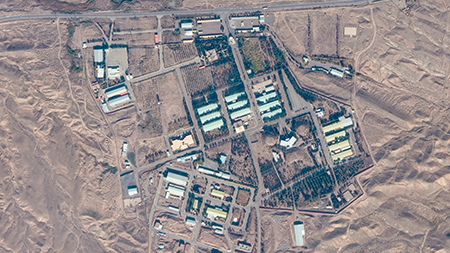"[Arms Control Today] has become indispensable! I think it is the combination of the critical period we are in and the quality of the product. I found myself reading the May issue from cover to cover."
Under U.S. Pressure, Israel Avoids Iran Nuclear Targets
November 2024
By Kelsey Davenport
Israel’s retaliatory strikes against Iran did not target the country’s nuclear program, despite calls from top Israeli officials to strike those assets. Prior to the retaliatory attack, U.S. President Joe Biden said that the United States would not support Israeli strikes against Iran’s nuclear facilities.

Israel targeted Iranian air defenses and missile production facilities in its Oct. 26 attack. Israeli aircraft also struck Parchin, a military site where Iran conducted illicit nuclear activities as part of its pre-2003 weapons program. Iranian media outlets reported that four soldiers were killed in the strikes.
Israeli Prime Minister Benjamin Netanyahu said that the attack “severely damaged” Iran’s missile production capabilities.
In a telephone call with journalists shortly afterwards, a senior Biden administration official said that the United States did not participate in the attack but had encouraged Israel to conduct a “targeted and proportional” response with “low risk of civilian harm.”
The U.S. official said that the Israeli strike “should be the end of this direct exchange of fire between Israel and Iran.”
Iranian officials appeared to downplay the impact of the strikes. The country’s supreme leader, Ayatollah Ali Khamenei, called for “actions that serve the interests of this nation and country,” but said that it would be up to the government to “convey the power and will” of Iran. Iranian President Masoud Pezeshkian said that Iran will respond appropriately but reiterated that it does “not seek war.”
The Israeli strike was a response to Tehran targeting three Israeli military bases with nearly 200 ballistic missiles on Oct. 1. Unlike Iran’s missile attack in April, Tehran did not provide much advance warning for the October strike, which was retaliation for Israel’s attacks against Hezbollah in Lebanon that resulted in the deaths of Hezbollah commander Hassan Nasrallah and Islamic Revolutionary Guard Deputy Commander Abbas Nilforoushan.
Israel, with the support of the United States and others, shot down most of the incoming missiles.
In an Oct. 1 statement posted on the social platform X, the Iranian Mission to the United Nations suggested that Iran’s missile strike was intended to deter future attacks by Israel. The statement said that if Israel retaliated for the Iranian strike or committed “further acts of malevolence,” it would face a “subsequent and crushing response.”
Netanyahu will likely continue to face pressure to attack Iran’s nuclear program even if Tehran does not retaliate for the Oct. 26 attack.
In an Oct. 1 statement, former Prime Minister Naftali Bennett said that Israel must “act now to destroy Iran’s nuclear program.” Israel has the tools and the justification and should not “settle for Iranian military bases,” Bennett said.
Although Israel could strike Iranian nuclear facilities without U.S. support, it would be challenging for Israel to destroy deeply buried sites, such as the Fordow uranium-enrichment facility, without the GBU-57 Massive Ordnance Penetrator, the largest conventional weapon in the U.S. arsenal.
A strike against the nuclear infrastructure could also backfire in the long run. Iranian officials have threatened to develop nuclear weapons or withdraw from the nuclear Nonproliferation Treaty if the country’s nuclear facilities are attacked. (See ACT, June 2024.)
Biden, like his predecessors, has stated that he would use military force to prevent Iran from obtaining a nuclear weapon. Although the country’s nuclear program is advancing, the U.S. intelligence community continues to assess that Iran is not pursuing nuclear weapons development. Following the Oct. 1 attack, CIA Director William Burns said that there is no evidence that Iran’s leadership has made the decision to develop nuclear weapons. Speaking at a conference on Oct. 7, Burns said the United States is “reasonably confident” that it would detect weaponization efforts early on.
